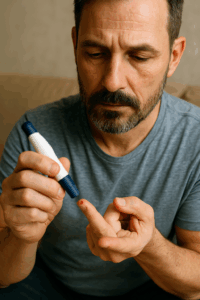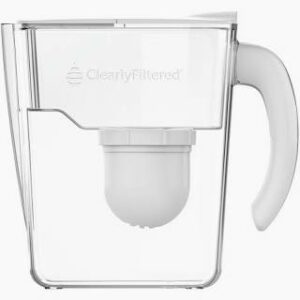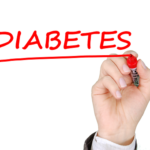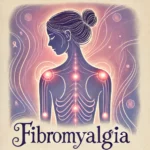Learn why tracking your blood pressure, blood sugar, and cholesterol levels—alongside eating fiber-rich foods and drinking enough water daily—can protect your heart, kidneys, and digestive system. Simple habits, big health gains.
📊 Understanding the “Silent Killers”: Why Monitoring Matters
High blood pressure, high cholesterol, and elevated blood sugar often have no early symptoms. Yet over time, these “silent killers” increase your risk of heart disease, stroke, kidney damage, and more.
🩺 What Is Blood Pressure (Hypertension)?

Blood pressure measures the force of blood pushing against artery walls as your heart pumps. Normal readings are typically around 120/80 mmHg. Hypertension, or high blood pressure, occurs when this force is too strong consistently. Over time, this can damage blood vessels, increase the workload on your heart, and contribute to serious complications such as stroke, kidney disease, and heart failure.
Affiliate Disclaimer:
This post contains affiliate links from trusted health brands. If you make a purchase through these links, I may earn a small commission — at no additional cost to you. Your support helps me continue delivering science-backed wellness content through AllHealthFit1. 💚 Thank you!
🍬 What Does It Mean to Have High Blood Sugar(Diabetes)?
Consistently elevated blood sugar (glucose) levels can signal prediabetes or diabetes. Diabetes impairs your body’s ability to properly use insulin, leading to serious issues such as nerve damage, kidney problems, eye disease, and heart complications. The Hemoglobin A1c (HbA1c) test gives a clear picture of long-term glucose control.

👉 Order your Hemoglobin A1c Test today Order on Ulta Lab
🧬 What Role Does Cholesterol Play in the Body?
Cholesterol is a waxy, fat-like substance found in every cell. It’s essential for building cell membranes, producing hormones, and supporting digestion. However, too much LDL (“bad”) cholesterol can accumulate in arteries, forming plaques that block blood flow. This increases your risk of heart attack and stroke.
Routine screening is the first step in prevention. Catching problems early can help you reverse or manage conditions before they become life-threatening.
👉 Order your Cholesterol (Lipid Panel) Test today 👉Order on Ulta Lab. Order your TSH Thyroid Test today 👉Order on Ulta Lab
Order your FIT Colorectal Screening Test today👉 Order on Life Line Screening.
🌿 Eat More Fiber to Support Gut and Bowel Health
Diet plays a major role in your overall health. A fiber-rich diet loaded with fresh fruits, vegetables, and whole grains can:
- Promote regular bowel movements
- Support the gut microbiome
- Reduce cholesterol levels
- Help regulate blood sugar
💩 Why Are Regular Bowel Movements Important?
Healthy bowel movements are a sign your digestive system is functioning properly. They help eliminate waste and toxins from your body. Infrequent or difficult bowel movements can lead to bloating, discomfort, and long-term gastrointestinal issues. Fiber helps keep things moving by adding bulk and improving stool consistency.

🍏 Examples of gut-friendly fiber-rich foods:
- Apples (with skin)
- Broccoli
- Chia seeds
- Lentils
- Leafy greens
According to the Gastroenterological Association, fiber not only supports digestion but may also reduce the risk of colon cancer.
💧 Stay Hydrated: Protect Your Kidneys and Bowels
Your kidneys act as your body’s filtration system. Staying well-hydrated ensures your kidneys can:
- Flush toxins effectively
- Prevent kidney stones
- Support healthy bowel function
Aim for at least 8 glasses of clean, filtered water daily. For best results, choose a high-quality water filtration system.

Clearly Filtered offers water pitchers designed to remove up to 99.99% of over 365 contaminants, including chlorine, fluoride, lead, arsenic, and PFAS, while retaining beneficial minerals. The pitcher is constructed from BPA- and BPS-free, medical-grade Tritan® plastic, ensuring durability and safety.
Water isn’t just hydration—it’s a cornerstone of kidney health, gut regularity, and detoxification.
🏃♀️ Weight Management with Movement: Simple Steps, Big Results
You don’t need a complicated gym routine to see benefits. Just 20-30 minutes of walking daily can:
- Support healthy weight
- Lower blood pressure
- Boost circulation
- Improve mood
According to the American Heart Association, consistent moderate exercise helps reduce your risk of cardiovascular disease.
Start with:
- Morning walks
- Light stretching routines
- Dancing or gardening
The goal is progress, not perfection. The more you move, the more your heart, metabolism, and immune system benefit.
🧪 Why Routine Testing Empowers Your Health
Testing isn’t just for when you’re sick — it’s your early warning system. Routine lab work helps uncover silent conditions like high blood sugar, hormone imbalances, or hidden inflammation before symptoms arise. It puts you in control, allowing you to take action early, track your progress, and make smarter health decisions. Lab results are your personalized health report — objective, powerful, and essential for prevention.
Here’s how a few critical tests can help:
-
Hemoglobin A1c: Provides a 2–3 month average of blood sugar levels to monitor diabetes risk.
👉 Order your test today -
TSH (Thyroid Stimulating Hormone): Detects thyroid hormone imbalance, which affects metabolism, mood, and energy.
👉 Order your test today -
Lipid Profile: Breaks down total cholesterol, HDL (“good”), LDL (“bad”), and triglycerides to assess heart disease risk.
👉 Order your test today -
FIT Colorectal Screening: Catches early signs of colon cancer when it’s most treatable.
👉 Order your screening test today
Don’t rely on symptoms. Trust your data — and take control of your health today!
🧠 Final Thoughts: Prevention Starts With You
You have more control over your health than you think. By monitoring key health indicators, choosing fiber-rich foods, staying hydrated, and staying active, you’re creating a strong foundation for longevity and vitality.
🔹 Take small steps daily. They’re easier to maintain and make a major difference over time. 🔹 Hydration and gut health are just as important as blood pressure and cholesterol monitoring. 🔹 Combining regular testing with smart lifestyle choices is the winning formula.
✨ AllHealthFit1 Perspective ✨
I see too many people wait until they feel unwell before paying attention to their body. But most chronic diseases begin silently. This is your reminder to be proactive, not reactive.
💪 Your health is worth it!
____________________________________________________________________________________________________________________________________________________________
❓ Frequently Asked Questions (FAQs)
1. What is considered a healthy blood pressure?
A normal blood pressure reading is around 120/80 mmHg. Anything above 130/80 may indicate elevated blood pressure or hypertension, which increases your risk for heart disease and stroke.
2. What does Hemoglobin A1c measure?
Hemoglobin A1c (HbA1c) measures your average blood sugar levels over 2–3 months. It’s commonly used to diagnose and manage diabetes or prediabetes.
3. Why is high cholesterol dangerous?
High levels of LDL (“bad”) cholesterol can lead to plaque buildup in your arteries, which raises your risk for heart attack, stroke, and other cardiovascular issues.
4. How much fiber should I eat daily?
Most adults should aim for at least 25–30 grams of fiber per day from fruits, vegetables, legumes, and whole grains to support digestion and heart health.
5. What is the FIT test used for?
The FIT (Fecal Immunochemical Test) screens for hidden blood in stool, which may be an early sign of colon cancer. It’s a simple, non-invasive home test.
6. Why is hydration important for health?
Staying hydrated supports kidney function, regulates body temperature, maintains energy levels, and aids in digestion and toxin removal.
7. Can walking really improve my health?
Yes! Walking just 20–30 minutes a day can lower your blood pressure, support weight loss, improve mood, and reduce your risk of chronic diseases.
8. What are triglycerides and why do they matter?
Triglycerides are a type of fat found in your blood. High levels can increase your risk of heart disease, especially when combined with high LDL or low HDL cholesterol.
9. How can I tell if I have diabetes?
Common signs include frequent urination, increased thirst, fatigue, and slow-healing wounds. A Hemoglobin A1c test can help confirm your diagnosis.
10. Is colon cancer preventable?
Early detection is key. Regular screenings like the FIT test and a high-fiber diet may help reduce your risk of developing colon cancer.
📚 References
- Mayo Clinic: Heart Disease Prevention
- American Diabetes Association: HbA1c Guidelines
- American Heart Association: Benefits of Walking
- Harvard Health: Cholesterol Monitoring
- Gastroenterological Association: Benefits of Fiber
📬 Want More Health Tips Like This?
Subscribe to our free newsletter 👉 “Healthy You Insider”
📬 Want to read more about hypertension? Read here 👉 🍃10 Empowering Tips for Healthy Eating to Manage Hypertension🍃
🌿 AI Disclosure: Portions of this article were enhanced with the assistance of AI tools to support idea generation and editing. All content has been carefully reviewed by the author to ensure accuracy, clarity, and alignment with health and wellness best practices.
In Health and Wellness,
Dr. Marjorie DiCarlo, M.D., Ph.D., M.P.H.
Founder, AllHealthFit1 ❤️🏃♀️🍃
🌱 More Wellness Reads 🌱
 Mastering Diabetes for a Healthier Life: Essential Facts You Need to Know
Mastering Diabetes for a Healthier Life: Essential Facts You Need to Know
 🍃 5 Everyday Habits That Secretly Harm Your Eyes and How to Fix Them! 🍃
🍃 5 Everyday Habits That Secretly Harm Your Eyes and How to Fix Them! 🍃
 Is There a Correlation Between Osteomalacia and Fibromyalgia?
Is There a Correlation Between Osteomalacia and Fibromyalgia?
 🍃10 Empowering Tips for Healthy Eating to Manage Hypertension🍃
🍃10 Empowering Tips for Healthy Eating to Manage Hypertension🍃
 🌿 Backed by Science: Latest Research on Stroke Prevention You Can Trust 🌿
🌿 Backed by Science: Latest Research on Stroke Prevention You Can Trust 🌿
 🌿 Are Carrots, Rich in Vitamin A, Truly Beneficial for Your Vision? 🌿
🌿 Are Carrots, Rich in Vitamin A, Truly Beneficial for Your Vision? 🌿
Powered by YARPP.
